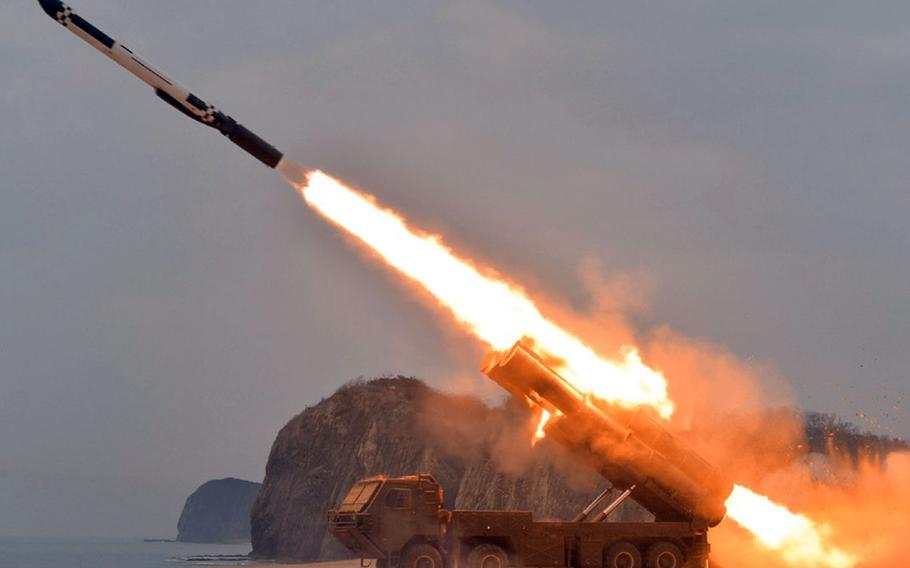
A North Korean missile is launched in this image released by the state-run Korean Central News Agency, Friday, Jan. 28, 2022. (KCNA)
CAMP HUMPHREYS, South Korea — North Korea flew a dozen warplanes Thursday near the border with South Korea, prompting the South to scramble more than 30 military aircraft in a dramatic escalation after a series of missile tests by the Communist regime.
The highly unusual moves took place hours after the North launched two ballistic missiles from Pyongyang into the East Sea, also known as the Sea of Japan, in the sixth round of tests in the past 12 days.
Following the missile tests, eight North Korean fighter jets and four bombers flew in formation and were believed to have conducted air-to-surface firing drills, South Korea’s military told The Associated Press.
South Korea responded by scrambling 30 fighter jets and other military aircraft, the Ministry of National Defense said.
Although North Korea has sent military aircraft near the border before, the Yonhap news agency said it was probably the first time so many aircraft had been launched in such a provocative manner.
North Korea’s recent missile tests have sharply escalated tension in the Korean Peninsula. The United States, South Korea and Japan have conducted joint exercises in response.
In Thursday’s tests, the North’s first missile flew roughly 217 miles at a peak altitude of 50 miles at Mach 5 speed, according to ministry estimates. The second flew roughly 497 miles at a peak altitude of 37 miles at Mach 6.
"Consecutive [North Korean] ballistic missile launches are a grave provocative act to harm not only the Korean Peninsula but also international peace and stability … and we condemn this strongly and urge North Korea to stop it immediately," the ministry’s text message said. "Our troops will maintain a firm readiness posture and are tracking and monitoring relevant moves in preparation for further [North Korean] provocations while working closely together with the U.S."
Thursday’s launch was also announced in a tweet from the Japanese Prime Minister’s Office. A separate message posted on the office’s English-language Twitter account said the projectile had “likely flown over Japan,” but that tweet was soon deleted.
The country’s defense minister, Yasukazu Hamada, told reporters that Japan immediately protested through the North’s embassy in Beijing, strongly condemning the act.
“We will continue working on drastically strengthening our defense power while examining every possibility, including the capability to attack enemy bases,” he said.
North Korea's foreign ministry said in a statement Thursday that the elevated tensions were caused by the Ronald Reagan Carrier Strike Group’s presence.
The launch comes one day after South Korea's Joint Chiefs of Staff announced that the nuclear-powered aircraft carrier USS Ronald Reagan and its strike group would redeploy near South Korea's eastern coast following anti-submarine drills with the South Korean and Japanese navies.
The Joint Chiefs cited the "highly unusual" timing of North Korea's provocations, which included an intermediate-range ballistic missile test on Tuesday.
The IRBM, suspected by experts to be a Hwasong-12 that can theoretically reach the U.S. territory of Guam, flew over Japan’s Aomori prefecture and prompted rare take-shelter warnings from the Japanese government and U.S. military. Aomori is home to Misawa Air Base, headquarters of the 35th Fighter Wing.
The launch, which marked the first time in five years that a North Korean missile flew over Japan, was described by Japanese Chief Cabinet Secretary Hirokazu Matsuno as an "extremely problematic act."
U.S. and South Korean jets on Tuesday afternoon dropped two Joint Direct Attack Munition, or JDAM, bombs on an island in response to the IRBM test. The next morning, the allies conducted a live-fire drill using the Army Tactical Missile System and launched several surface-to-surface missiles toward the East Sea.
One of the missiles fired by South Korea failed and crashed inside of a military base. No injuries were reported, according to the South Korean military.
U.N. Assistant-Secretary-General Khaled Khiari on Wednesday condemned North Korea's launches and said it violated the group's Security Council resolutions.
"This launch risks triggering a significant escalation of tensions in the region and beyond," he said, according to a press release on Wednesday. "It is of serious concern that [North Korea] has again disregarded any consideration for international flight or maritime safety."
U.S. Ambassador to the U.N. Linda Thomas-Greenfield said in a tweet Thursday that the Security Council was concluding a meeting on North Korea's launches when it heard of the latest test.
"Stop the reckless, provocative, and escalatory behavior and return to dialogue," she wrote.
North Korea has launched roughly 40 missiles so far this year, a record. The regime is also suspected by the U.S. and South Korea of having prepared to conduct a seventh nuclear test, its first since 2017.
Stars and Stripes reporter Hana Kusumoto and The Associated Press contributed to this report.